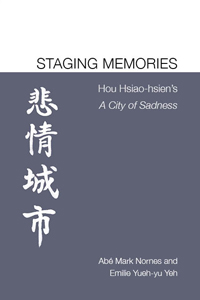
Staging Memories: Hou Hsiao-hsien’s A City of Sadness
Skip other details (including permanent urls, DOI, citation information): This work is licensed under a Creative Commons Attribution-NonCommercial-NoDerivatives 3.0 License. Please contact [email protected] to use this work in a way not covered by the license.
For more information, read Michigan Publishing's access and usage policy.
Introduction
A City of Sadness (Beiqing chengshi 悲情城市), the winner of the Golden Lion Award at the 1989 Venice Film Festival, was made by Hou Hsiao-hsien (侯孝賢), one of the foremost filmmakers of the New Cinema of Taiwan. Hou, along with other young filmmakers such as Edward Yang Dechang (楊德昌, 1947–2007), belongs to a new generation that came of age after 1949, a period of remarkable growth and change in Taiwan. With the exception of Hou, who worked his way through apprenticeships with veteran studio directors, the new, young directors received formal training in the West. They broke away from the martial arts flicks, melodramatic romances, and historical epics haunted by memories of the mainland, all of which dominated Taiwan’s film industry. Hou’s films deal with the changing reality of life in Taiwan, its generation gap, and the increasing divergence between rural and urban cultures. What further distinguishes Hou’s films is the cinematic style through which he portrays changes in Taiwanese society. His films are strongly autobiographical, thereby presenting a platform for staging memories. These can be personal or collective, encompassing changes in modern Taiwanese society as well as the history of Taiwanese cinema.
City of Sadness is among Hou’s most ambitious works and is the first Taiwanese film to achieve a major international prize. While all his previous films were to some extent criticized for being too personal, City of Sadness ventures into history by bringing his highly developed cinematic style to what amounts to an epic of the birth of a nation. It is the first Taiwanese film to broach the subject of the most traumatic experience in the nation’s history, the February 28 Incident. This was a 1947 massacre by the Nationalist Party that resulted in 18,000 to 28,000 deaths. Using a family as a matrix through which to filter the historical events at the moment of the founding of the nation, Hou re-presents Taiwanese history in both micro and macro perspectives.
The film’s plot is exceedingly complex, centering on the Lin family in Taiwan after the 1945 surrender of the Japanese. The family relations are so elaborate that several magazines have even published family trees to accompany articles on the film. Taiwan had been a Japanese colony for the previous fifty years until the Chinese Nationalist government began taking over the island after World War II. The oldest of four brothers in the Lin family turns his Japanese-style bar into “Little Shanghai” to cash in on the postwar boom. The second Lin brother had disappeared during the war in the Philippines. The third brother, having returned from Shanghai and recovered from a mental breakdown, associates with Shanghainese drug smugglers. However, when the first brother finds out about this drug business, he confiscates a certain amount of drugs and forbids the third brother to continue his involvement with the mainlanders. This leads the Shanghainese to use their military connections to frame the third brother, who is accused as a Japanese collaborator during the war and jailed. After the big brother reconciles with the gangsters from Shanghai, the third brother is eventually released, emerging from prison as a physical and mental wreck. The youngest brother, Lin Wen-ching, is deaf and cannot speak, and supports himself with a photo studio. Wen-ching and his circle of young friends are convinced that socialism will be the ultimate tool for the Taiwanese to repel outside colonial forces. It is a position that makes them targets of the new regime.
The violence of the February 28 Incident and the subsequent social climate transform the family. Wen-ching is arrested, along with many of his friends. Upon his release, his best friend Hinoe, having been involved in the antigovernment movement, is forced to flee to the mountains to join the guerrillas. Wen-ching also wants to join the guerrillas, but he is persuaded to stay behind and take care of Hinoe’s sister, Hinomi.
Later, the older brother dies in a fight with rival gangs. Shortly after the older brother’s funeral, Wen-ching marries Hinomi and they have a son. Then her brother’s guerrilla encampment is raided by the military and Wen-ching is arrested. The film ends with what is left of the deeply scarred Lin family, living despite their wounds by struggling to maintain the mundane basis of their lives.


